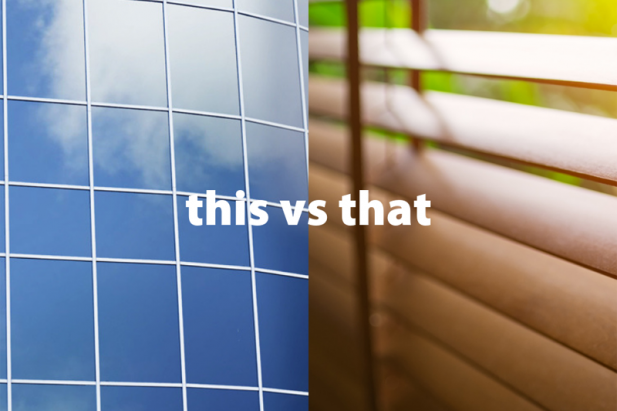
This vs that: tinted windows vs window treatments
Windows help define a space, as do their finishing touches
When making those finishing choices for your new construction or remodel, windows must be given more than a glance. After all, windows contribute to both the light in your space and the temperature of your interior, not to mention they leave a lasting visual impression. The finishing touches you choose for your windows can make a huge difference in the atmosphere you create within your space. Will you opt for window treatments, such as blinds or drapes? Or do you want to explore tinted windows as an option? And what are the pros and cons of each?
We wanted to take a closer look at these two choices, and the benefits and drawbacks of each. Here’s what we have learned over our years of experience.
Window treatments or tinted windows? The good, the bad and the budget-friendly.
Tinted windows
Tinted windows may be selected for a number of reasons, but they also have their potential disadvantages.
- Window film is usually less expensive than other window treatment options, such as drapes, curtains and blinds.
- It can be easily applied to the interior of windows and removed cleanly from your window.
- Tinted windows reduce glare, which can be easier on the eyes, and at the same time allow natural light in the room.
- Aesthetically, window film may not have the same appeal as window treatments, as it is not generally decorative in nature, though options may be available.
- Tinted windows offer a level of privacy but occupants can still have a view of the outdoors. It is not a solution for spaces that require complete privacy.
- Tinted windows tend to be more energy efficient, blocking up to ¾ of solar heat and absorbing even more. The result: cooling bills may be lowered over what you would experience with window treatments.
- Window film reduces heat loss in winter.
- Window tint is also known to block nearly all ultraviolet rays, protecting furniture, carpet and more from fading. UV blocking window tint also protects skin from those harmful rays.
- Glass that shatters will be held together by the film, offering a safety feature not provided by other window treatments.
- Window film requires almost no maintenance. Dust and buildup are not an issue with window tint; it’s generally far easier to clean than window treatments such as blinds.
Window blinds, shades, curtains and drapes
The benefits of window treatments are many, but they have some potential drawbacks, as well.
- Styles are wide ranging, and chances are good you can find a style that fits your interior’s look and feel. They can add decorative flair to a room.
- Blinds, drapes, shades and curtains can reduce glare and visible sunlight within a space. However, if used to block light, additional interior lighting will be needed to make up for the reduction of natural light.
- Blinds may radiate heat from the sun into a room, which can increase your cooling bill. Shades may be effective at blocking solar heat to some degree if they are closed and light in color. Darker shades, however, can actually trap solar heat and transfer it to the room, potentially increasing energy costs.
- Window treatments generally do not protect your interior such as carpet and furniture from fading. Blinds and other window treatments don’t necessarily block ultraviolet rays.
- Window treatments can offer total privacy in rooms where it is desirable, such as bathrooms, bedrooms and boardrooms.
- Blinds and other window treatments can offer a classic look.
- Window treatments may prevent shattering glass from flying into a room to some degree, but they offer less protection than tint, which can actually hold the glass together and increase its durability.
- Window treatments can be very difficult and time-consuming to clean. This is unfortunate, as they are known to collect dust, buildup and insects.
- Blinds, drapes, shades and curtains are generally more expensive than window film.
Your windows: a picture into your everyday life
Whether you decide window treatments or tint are right for you, your windows are a part of the picture of your everyday life. Do you want privacy or natural light flowing within a space? Are you looking for cost savings, or something with a decorative “wow” factor? How concerned are you about UV protection and durability? The choice is yours, and hopefully this in-depth look at the benefits and potential drawbacks of tinted windows and window treatments helps you make a decision you’re happy with for years to come.